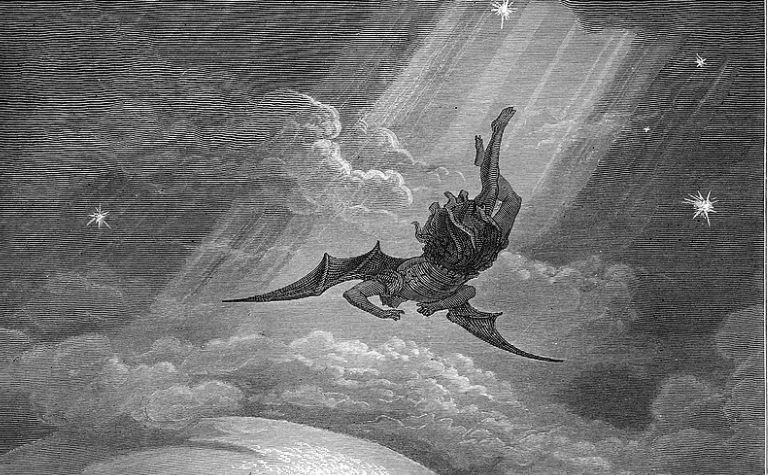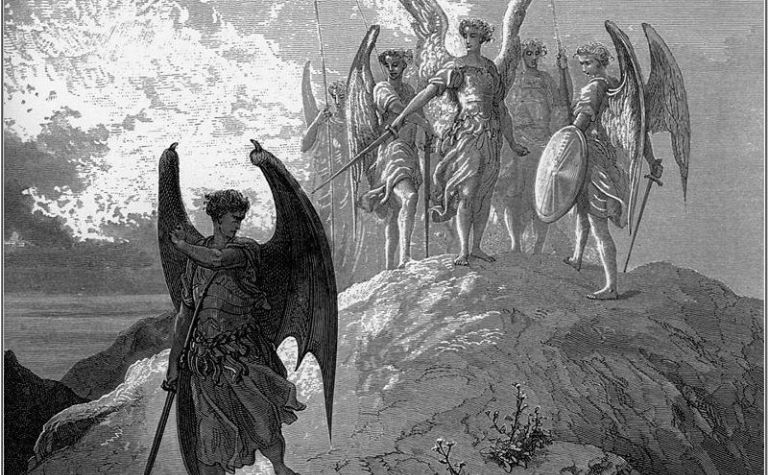Lucifer, who is often referred to as Satan or the devil in the Bible, is a sinister fallen angel who opposes God, his plan, and his people. He successfully tempted Adam and Eve in the Garden of Eden and unsuccessfully enticed Jesus Christ to rebel in the desert. While Lucifer’s activity on earth is known, his role in heaven is more mysterious. The Bible teaches that Lucifer was a guardian in heaven. Before God cast him out, his job was to serve God. In the Old Testament, the job of a guardian was to provide protection. As a cherub, Lucifer had a high rank and an important role in heaven before he sinned.
The prophet Ezekiel mentions Lucifer’s privilege (“anointed”), classification (“cherub”), and his job in heaven. Ezekiel 28:14 reads, “You were an anointed guardian cherub. I placed you; you were on the holy mountain of God; in the midst of the stones of fire you walked” (ESV). Ezekiel refers to Lucifer’s job again when he says why God cast him out. “In the abundance of your trade you were filled with violence in your midst, and you sinned; so I cast you as a profane thing from the mountain of God, and I destroyed you, O guardian cherub, from the midst of the stones of fire” (Ezekiel 28:16).

God created Lucifer to serve him. So Lucifer’s job of guarding was related to that function. One Christian theologian writes, “Not only was [Lucifer] an anointed leader, but twice was called a guardian (covering) cherub. This could refer to his role as a guardian — an honor guard — and proclaimer of God’s glorious presence and holiness.” [1] The word “guardian” comes from the Hebrew word cakak, meaning “cover.” Sometimes, the Old Testament depicts covering as protection, like when God shields someone from danger.
| Hebrew word | הַסּוֹכֵ֑ךְ |
| English pronunciation | has-so-w-kek |
| Basic meaning | who covers |
| Range of meaning | cover, defense, defend, hedge in, join together, set, shut up |
| translated “guardian” | NIV, NLT, ESV |
| translated “covers” | KJV, NKJV, NASB |
The same Hebrew word describes the wings of cherubim “covering” the mercy seat that was on top of the Ark of the Covenant (Exod. 25:20). The same root word carries the meaning of guarding in Psalm 91:4, which all major translations render similarly: “He will cover you with his pinions, and under his wings you will find refuge; his faithfulness is a shield and buckler” (ESV, emphasis added). English Bible translations render the same Hebrew word differently in Psalm 5:11, yet all have the meaning of guarding:
- “spread your protection” (NIV, ESV)
- “thou defendest them (KJV)
- “You defended them” (NKJV)
- “You shelter them” (NASB)
Bible scholar Daniel Block writes, “Since the time of Origen, many conservative Christians in particular have equated the king of Tyre with Lucifer (=Satan), ‘Brilliant One, son of the morning,’ mentioned in Isa. 14:12. Accordingly, Ezekiel’s prophecy is though to recount the circumstances of the original fall of Satan, who had previously been one of the cherubim attending the throne of God.” [2]

Does the name “Lucifer” shed light on Satan’s role?
The name “Lucifer” appears only in the King James Version (KJV) and New King James Version (NKJV) of the Bible and only in Isaiah 14:12. The KJV reads, “How art thou fallen from heaven, O Lucifer, son of the morning!” The NKJV reads, “How you are fallen from heaven, O Lucifer, son of the morning!”
Other English translations render the Hebrew according to what the name Lucifer literally means: “Morning star” (NIV), “shining star” (NLT), “Day star” (ESV), “Shining morning star” (HCSB), and “O Day Star, son of Dawn” (NRSV). The Bible refers to angels as stars in multiple passages (e.g., Job 38:7, “the morning stars”).
Most English translations don’t use the name “Lucifer” because its roots aren’t Hebrew — the original language of Job — but Latin. The name “Lucifer,” originating centuries after Christ, is from Old English via Latin. The Latin word for light is “luc-” and the word for “bearing is “-fer.” Therefore, “Lucifer” means “light-bringing” or “morning star.”
Christian theology sometimes uses the name “Lucifer” to describe Satan in his pre-fall condition and other names like Satan and devil to refer to his post-fall condition. The two most common names in the Bible for the first fallen angel are “Satan,” which appears 52 times, and “devil,” which appears 35 times.
The description of Satan as a “morning star” or “Day star” teaches that he was once a beautiful creature who was sinless and blameless as he served God in heaven. Ezekiel 28:12 corroborates this understanding: “You were the signet of perfection, full of wisdom and perfect in beauty.”

Why did Lucifer fall from heaven?
Historically, Christian scholars generally agree that pride was Lucifer’s downfall. However, they don’t always agree on what Bible passages teach. For example, there is significant disagreement among scholars about whether Isaiah 14:12-17 teaches it, yet there is more agreement about Ezekiel 28:1-19 teaching it. Most Christian scholars believe that 1 Timothy 3:6 teaches that pride was Satan’s downfall. The context of the verse is about the qualifications of overseers or elders. In the passage, Paul warns that a person who serves in that role mustn’t be prideful, or else they will fall as the devil did.
| Translation | 1 Timothy 3:6 |
|---|---|
| ESV | He must not be a recent convert, or he may become puffed up with conceit and fall into the condemnation of the devil. |
| KJV | Not a novice, lest being lifted up with pride he fall into the condemnation of the devil. |
| NASB | and not a new convert, so that he will not become conceited and fall into the condemnation incurred by the devil. |
| NIV | He must not be a recent convert, or he may become conceited and fall under the same judgment as the devil. |
| NLT | A church leader must not be a new believer, because he might become proud, and the devil would cause him to fall. |
A minority view of the verse, reflected in the NLT translation, argues that the devil could cause an unqualified elder to fall into sin. However, the majority view, reflected in the other translations, is that an unqualified elder might succumb to the pride of sin and fall as a result, just as Lucifer succumbed to the pride of sin and fell as a result.
References:
[1] Angels Elect and Evil by C. Fred Dickason. p. 136.
[2] The Book of Ezekiel by Daniel Block. 118.
Source
Source
Related Articles
A serpent plays an important role in Genesis, the first book of the Bible, and in Revelation, the last book. Scripture also mentions them in other places in the Old and New Testaments that are...
Lucifer, also called Satan and the devil, was once a holy, pure, beautiful angel. According to the Bible, Lucifer was part of God's good creation. But then everything changed. The holy angel became a...
